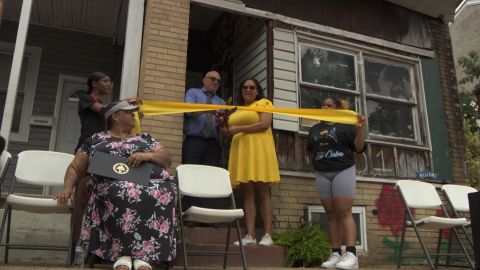JUDY WOODRUFF: But first: Last month, authorities in Orange County, California, cleared hundreds
of homeless people from an area known as the Riverbed in Santa Ana.
But less visible are the people who struggle to find and hang onto a stable, affordable
place to live, many of them low-wage workers.
Special correspondent Cat Wise has a report from Anaheim, California, as part of our ongoing
Chasing the Dream series.
CAT WISE: There's a lot to be happy about in Anaheim, California.
A record-breaking 24.2 million tourists visited the city and its well-known theme parks last
year.
Unemployment is low, hotels are full, restaurants are busy, and there's no shortage of smiles.
But away from the palm tree-lined main streets, there are neighborhoods not often seen by
tourists, where tens of thousands of workers live who play a vital role in the region's
booming economy.
Many are making around minimum wage, $11 an hour, and housing is often a daily challenge.
Converted garages, motel rooms, spare bedrooms, cars, and tents have become shelters of necessity
in this area, which has some of the highest housing costs in the county.
JOSE MORENO, Anaheim City Council Member: The housing wage -- that is how much someone
has to make per hour to afford a basic apartment - - is $24 to $26 an hour.
And the folks who live in this area earn somewhere between $11 to $13 an hour.
CAT WISE: Jose Moreno is an Anaheim City council member who represents a district with a large
number of low-income workers.
Last year, Anaheim declared a homeless state of emergency.
And he led a task force to study the problem.
JOSE MORENO: Wages have stagnated.
Although unemployment is going down, housing costs are going up.
If you're not paying your workers a wage they can live on in the local economy, then that
creates a lot of stress on the social system of the city.
CAT WISE: One of those who is struggling is 58-year-old Glynndana Shevlin, who has worked
at Disneyland for 30 years.
She's a full-time host in a VIP lounge at one of the resort's hotels, and she's a member
of a labor union which represents Disney hotel and restaurant workers.
GLYNNDANA SHEVLIN, Disney Employee: I love my job.
I love the guests that come in.
I have a panoramic view of downtown Disney and both the parks.
CAT WISE: While Shevlin loves her job, and the health insurance she receives, she doesn't
love her pay.
She makes $15.70 an hour.
She has struggled for years to find stable, affordable housing.
Last summer, a friend rented her a bedroom, a significant improvement over other places
she's stayed, including a shelter for women, motels, and friends' couches.
But Shevlin says she's barely making it month to month.
GLYNNDANA SHEVLIN: At work, I'm happy-go-lucky.
I look good.
I look like I lived a privileged life.
But, actually, to tell you the truth, when I come home, it's a struggle.
I haven't been able to shop this week.
I couldn't pay rent this month.
Things keep going up, but wages aren't.
I feel like I'm a working poor, which is an oxymoron, that you shouldn't have to be poor
when you're working.
I'm working 40 hours a week.
CAT WISE: It's not hard to find others who are facing similar employment and housing
hardships.
In a nearby community, a $1,000-a-month converted garage with an outside shower and no kitchen
is the current home of Lupe Acevedo, her mom, and five children.
The family receives government assistance, but Acevedo also works two minimum wage jobs
at a small store and a food truck.
Last year, they were in a motel.
And when we visited, she was worried she might have to move again.
LUPE ACEVEDO, California: My kids, they tell me, mom, is this going to be our life?
They are like afraid to live in the streets.
I will do anything I can, so that they can get a roof.
CAT WISE: Although low hourly wages are common throughout every sector of the economy, Orange
County's largest employer, Disneyland, attracts a lot of attention; 30,000 full- and part-time
employees, known as cast members, work there.
A recent survey of the company's union employees, about 5,000 of whom responded, found: "More
than 85 percent earn less than $15 an hour.
And almost three-quarters said they do not earn enough money for basic expenses every
month."
PETER DREIER, Occidental College: Eleven percent of Disney workers have been homeless at some
point in the last two years.
CAT WISE: Late last month, the survey's authors, from Occidental College and the nonprofit
Economic Roundtable, presented their findings to a packed crowd.
The survey was requested and funded by a coalition of resort labor unions, two of which are currently
in contract negotiations with Disney.
Disney declined to do an on-camera interview, but provided this statement: "This inaccurate
and unscientific survey was paid for by politically motivated labor unions, and its results are
deliberately distorted and do not reflect how the overwhelming majority of our 30,000
cast members feel about the company.
While we recognize that socioeconomic challenges exist for many people living in Southern California,
we take pride in our employment experience."
Disney also noted it has created 4,000 jobs in the last five years, more than any other
Orange County business, and it's launching a new higher education and vocational training
program for hourly workers.
TOM TAIT, Mayor of Anaheim, California: It's bigger than one company.
CAT WISE: Tom Tait is Anaheim's mayor.
He favors higher wages, but says the problem of affordable housing can not be easily solved
by local government.
TOM TAIT: We have a tough time affecting the price of housing.
With land so expensive, it's very difficult to build something that is affordable.
The problem is systemwide.
Everything is expensive.
So we could help a few families here and there, but to help the thousands that we're talking
about, tens of thousands, I don't see where - - there's nowhere near that kind of funding.
CAT WISE: In the past, Anaheim did have more money to help build affordable apartments
complexes, like this one, using state redevelopment funds, but that money largely dried up in
2012.
According to city records, just 300 units for low- and very-low-income renters were
built or rehabbed between 2014 and 2016.
Some 30,000 are now on a city wait-list for affordable housing, and 20,000 are on a wait-list
for Section 8 federal housing vouchers.
Jose Moreno is one of the few voices in city leadership who believe developers should be
required and incentivized to include affordable units in new projects or contribute to a housing
fund.
JOSE MORENO: The city doesn't have an affordable housing policy, so, as a result, we depend
on the market to take care of this, and we know that the market is just not taking care
of it.
CAT WISE: California's minimum wage will go up to $15 an hour by 2022, but local unions
don't want to wait that long.
They're now trying to collect enough signatures to put a measure on the November ballot that
would raise wages to $15 an hour next year.
It would target large hospitality businesses who receive city subsidies, including Disneyland.
For the "PBS NewsHour," I'm Cat Wise in Anaheim, California.



